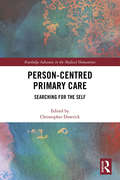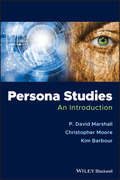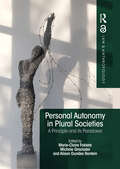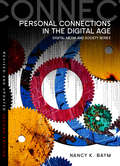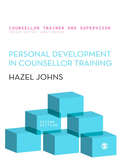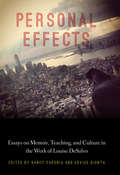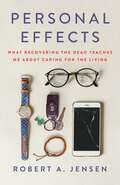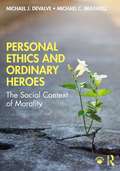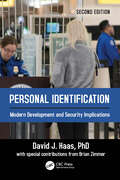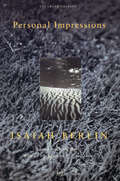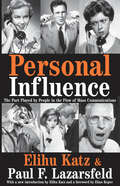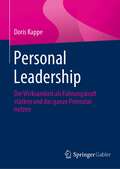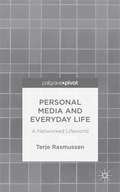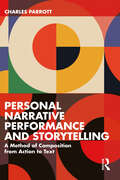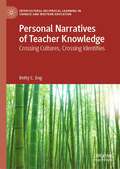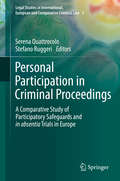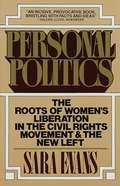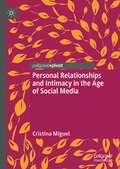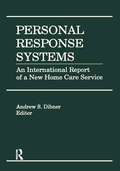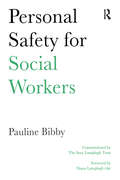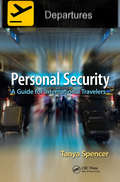- Table View
- List View
Person-centred Primary Care: Searching for the Self (Routledge Advances in the Medical Humanities)
by Christopher DowrickPrimary care, grounded in the provision of continuous comprehensive person-centred care, is of paramount importance in the delivery of accessible and effective health care around the world. The central notion of person-centred care, however, relies on often-unexamined concepts of self, or understandings of what it means to be a person and an agent. This cutting-edge book explores contemporary pressures on the sense of self for both patient and health professional within a consultation and argues that building new concepts of the self is essential if we are to reinvigorate the central tenets of person-centred primary care. Contemporary trends such as shared decision-making between health professionals and patients and promoting self-management assume those involved are able to make their own decisions and take action. In practice, however, medicine often opts for reductionist perspectives of patients as passive mechanical systems and diseases as puzzles. At the same time, huge political and organisational changes mean time and resources are scarce, putting further pressure on consultations. This book discusses how we can start to resolve these tensions. The first part considers problems posed by the increasing bureaucratisation of primary care, the impact of information technology in the consultation, the effects of chronic disease on our sense of self and how an emphasis on biology over biography leads to over-diagnosis. The second part proposes solutions based on a strong ontology of consciousness, concepts of creative capacity, coherence and engagement, and will show how these can enhance the self-esteem of patients and doctors and benefit their therapeutic dialogue. Combining theoretical perspectives from philosophy, sociology and healthcare research with insights drawn from clinical practice, this edited volume is suitable for those researching and studying primary healthcare, communication and relationships in healthcare and the medical humanities.
Persona
by Hiroaki Sato Naoki InoseYukio Mishima (b. 1925) was a brilliant writer and intellectual whose relentless obsession with beauty, purity, and patriotism ended in his astonishing self-disembowelment and decapitation in downtown Tokyo in 1970. Nominated for the Nobel Prize, Mishima was the best-known novelist of his time (works like Confessions of a Mask and The Temple of the Golden Pavilion are still in print in English), and his legacy--his persona--is still honored and puzzled over. Who was Yukio Mishima really? This, the first full biography to appear in English in almost forty years, traces Mishima's trajectory from a sickly boy named Kimitake Hiraoka to a hard-bodied student of martial arts. In detail it examines his family life, the wartime years, and his emergence, then fame, as a writer and advocate for traditional values. Revealed here are all the personalities and conflicts and sometimes petty backbiting that shaped the culture of postwar literary Japan. Working entirely from primary sources and material unavailable to other biographers, author Naoki Inose and translator Hiroaki Sato together have produced a monumental work that covers much new ground in unprecedented depth. Using interviews, social and psychological analysis, and close reading of novels and essays, Persona removes the mask that Mishima so artfully created to disguise his true self. Naoki Inose, currently vice governor of Tokyo, has also written biographies of writers Kikuchi Kan and Osamu Dazai. New York-based Hiroaki Sato is an award-winning translator of classical and modern Japanese poetry, and also translated Mishima's novel Silk and Insight.
Persona Studies: An Introduction
by Christopher Moore P. David Marshall Kim BarbourThe definitive and first major text on personas in contemporary culture Modern social media and communication technologies have reshaped our identities and transformed contemporary culture, revealing an expanded and intensified reforming of our collective online behavior. Billions of people worldwide are increasingly engaged in the production, presentation, and modification of their public selves—curating personas through various social media and fundamentally altering how we interact in the twenty-first century. The study of persona is essential to understanding contemporary culture, yet literature in this emerging field is scarce. Filling a gap in current knowledge, Persona Studies: An Introduction is the first major work to examine the construction, delivery, and curation of public identities in contemporary online culture. This timely book helps readers navigate the changing cultural landscape while laying the groundwork for further research and application of persona studies. Three case studies are included—examining personas of the artist, gamer, and professional—to illustrate how personas continue to transform identity and reshape contemporary culture. From the historical precursors of the current iteration of persona to emerging configurations of public self, this unique work offers readers a broad introduction to the evolving theories and concepts of how persona defines the contemporary condition and its relation to technology and collective identity. To summarize, the book: Analyzes how identities linked to data are cultivated, curated and mined for various purposes Discusses the mediated blending of media and different types of interpersonal communication Explores tools for the investigation and analysis of persona, including Prosopographic field studies and information visualization Translates new research, concept, theories, methods, and approaches into clear case studies and applications Examines the personalization of public, private, and intimate information in the building of new personas Persona Studies: An Introduction is an innovative resource for students, academics, researchers, and professionals in fields covering digital and social media, technology and culture, mass media and communications, social and media psychology and sociology, and professional studies.
Persona – über die Funktion der Maske in den Künsten: Ein Vergleich zwischen Theater, Computerspiel und sozialem Rollenspiel (Simulatio. Theatertechniken in Literatur, Medien und Wissenschaft)
by Daniel Martin Feige Kirsten Dickhaut Sven Thorsten KilianDer Sammelband thematisiert Masken und Maskierungen. Im Vergleich der Künste untersucht er die funktionale Verwendung dieses Theaterrequisits, das eine Technik impliziert, und die Ausgestaltungen von Persona in den Künsten, Maskenverwendungen, -gestaltungen und -problematisierungen, die stets die Produktion von Fiktion und/oder Simulation reflektieren. Zehn Beiträge analysieren Beispiele seit dem 18. Jahrhundert der bildenden Kunst, des Digitalen, des Computerspiels, des Theaters, der erzählenden Literatur und der sozialen Rolle, die jeweils die Maske als Fiktions- oder Simulationsgenerator verstehen, thematisieren und kulturell vergleichend beschreiben. Pirandello stellt dabei grundsätzlich einen wichtigen, aber nicht den einzigen Referenzpunkt dar.
Personal Autonomy in Plural Societies: A Principle and its Paradoxes (Law and Anthropology)
by Alison Dundes Renteln Marie-Claire Foblets Michele GraziadeiThis volume addresses the exercise of personal autonomy in contemporary situations of normative pluralism. In the Western liberal tradition, from a strictly legal and theoretical perspective the social individual has the right to exercise the autonomy of his or her will. In a context of legal plurality, however, personal autonomy becomes more complicated. Can and should personal autonomy be recognized as a legal foundation for protecting a person’s freedom to renounce what others view as his or her fundamental ‘human rights’? This collection develops an interdisciplinary conceptual framework to address these questions and presents empirical studies examining the gap between the principle of personal autonomy and its implementation. In a context of cultural diversity, this gap manifests itself in two particular ways. First, not every culture gives the same pre-eminence to personal autonomy when examining the legal effects of an individual’s acts. Second, in a society characterized by ‘weak pluralism’, the legal assessment of personal autonomy often favours the views of the dominant majority. In highlighting these diverse perspectives and problematizing the so-called ‘guardian function’ of human rights, i.e., purporting to protect weaker parties by limiting their personal autonomy in the name of gender equality, fair trial, etc., this book offers a nuanced approach to the principle of autonomy and addresses the questions of whether it can effectively be deployed in situations of internormativity and what conditions must be met in order to ensure that it is not rendered devoid of all meaning.
Personal Connections in the Digital Age (Digital Media and Society)
by Nancy K. BaymThe internet and the mobile phone have disrupted many of our conventional understandings of ourselves and our relationships, raising anxieties and hopes about their effects on our lives. In this second edition of her timely and vibrant book, Nancy Baym provides frameworks for thinking critically about the roles of digital media in personal relationships. Rather than providing exuberant accounts or cautionary tales, it offers a data-grounded primer on how to make sense of these important changes in relational lifeFully updated to reflect new developments in technology and digital scholarship, the book identifies the core relational issues these media disturb and shows how our talk about them echoes historical discussions about earlier communication technologies. Chapters explore how we use mediated language and nonverbal behavior to develop and maintain communities, social networks, and new relationships, and to maintain existing relationships in our everyday lives. The book combines research findings with lively examples to address questions such as: Can mediated interaction be warm and personal? Are people honest about themselves online? Can relationships that start online work? Do digital media damage the other relationships in our lives? Throughout, the book argues that these questions must be answered with firm understandings of media qualities and the social and personal contexts in which they are developed and used.This new edition of Personal Connections in the Digital Age will be required reading for all students and scholars of media, communication studies, and sociology, as well as all those who want a richer understanding of digital media and everyday life.
Personal Development in Counsellor Training (Counsellor Trainer & Supervisor)
by Ms Hazel JohnsThis book provides the answers to that all- important question: what are personal and professional development and why are they necessary for counsellors? This new edition explores: @! the importance of personal development and the core concepts that underpin it @! the aims, commonalities and differences of personal development in different settings and levels of training @! the key differences in theoretical approaches and their implications for personal development @! communication and relationships between counsellors and professional organizations, society, and the 'virtual' world, with all its demands on identity, privacy and congruence. @! the trainee and trainer and the challenges of personal development. Packed full of vivid accounts of personal experiences, questions and points for reflection, this book will prove an essential companion for anyone wishing to grow personally and professionally as a therapist. Hazel Johns is a Fellow of BACP, and has been for many years a trainer, supervisor and BACP-accredited counsellor.
Personal Effects: Essays on Memoir, Teaching, and Culture in the Work of Louise DeSalvo (Critical Studies in Italian America)
by Nancy Caronia and Edvige GiuntaCelebrating one of the most important Italian American female authors of our time, Personal Effects offers a lucid view of Louise DeSalvo as a writer who has produced a vast and provocative body of memoir writing, a scholar who has enriched our understanding of Virginia Woolf, and a teacher who has transformed countless lives. More than an anthology, Personal Effects represents an author case study and an example for modern Italian American interdisciplinary scholarship.Personal Effects examines DeSalvo’s memoirs as works that push the boundaries of the most controversial genre of the past few decades. In these works, the author fearlessly explores issues such as immigration, domesticity, war, adultery, illness, mental health, sexuality, the environment, and trauma through the lens of gender, ethnic, and working-class identity. Alongside her groundbreaking scholarship, DeSalvo’s memoirs attest to the power and influence of this feminist Italian American writer.
Personal Effects: What Recovering the Dead Teaches Me About Caring for the Living
by Robert A. JensenThe owner of the world’s leading disaster management company chronicles the unseen world behind the yellow tape, and explores what it means to be human after a lifetime of caring for the dead.You have seen Robert A. Jensen—you just never knew it. As the owner of the world’s largest disaster management company, he has spent most of his adult life responding to tragedy. From the Oklahoma City bombing, 9/11, and the Bali bombings, to the 2004 South Asian Tsunami, Hurricane Katrina, the 2010 Haitian Earthquake, and the Grenfell Tower Fire, Jensen has been at the practical level of international incidents, assisting with the recovery of bodies, identifying victims, and repatriating and returning their personal effects to the surviving family members. He is also, crucially, involved in the emotional recovery that comes after a disaster: helping guide the families, governments, and companies involved, telling them what to expect and managing the unmanageable. As he explains, “If journalists write the first rough draft of history, I put the punctuation on the past.”Personal Effects is an unsparing, up-close look at the difficult work Jensen does behind the yellow tape and the lessons he learned there. The chronicle of an almost impossible and grim job, Personal Effects also tells Jensen’s own story—how he came to this line of work, how he manages the chaos that is his life, and the personal toll the repeated exposure to mass death brings, in becoming what GQ called “the best at the worst job in the world.” A rare glimpse into a world we all see but many know nothing about, Personal Effects is an inspiring and heartwarming story of survival and the importance of moving forward, Jensen allows his readers to see over his shoulder as he responds to disaster sites, uncovers the deceased, and cares for families to show how a strong will and desire to do good can become a path through the worst the world can throw at us.
Personal Ethics and Ordinary Heroes: The Social Context of Morality
by Michael C. Braswell Michael J. DeValvePersonal Ethics and Ordinary Heroes: The Social Context of Morality examines what it means to be an authentic hero and provides real-life narratives that underscore the ethical principles guiding decision-making in the justice system and beyond. This engaging work revolves around a collection of excerpts from students studying ethics and social justice. The essays were responses to an invitation to write about and discuss a hero in their lives who motivated them to be more just, compassionate and morally responsible persons. These essays, collected over several years, portray shared meanings of heroism rooted in themes like sacrifice, perseverance and wisdom. The authors set student narratives in dialogues related to ethics and leadership that are both entertaining and useful for contemporary students and practitioners. This book illustrates the lessons of ethics in criminal and social justice practice and makes them tangible to students. Fostering the benefits of experiential learning, it brings real meaning to students of criminal justice as well as professionals in the criminal justice field and other areas of human and social service practice. It is an essential accompaniment to primary texts used in ethics courses and training seminars. This book is intended for use in undergraduate classes in applied human sciences and services like criminal justice, criminology, social work and political science. It is particularly well-suited for classes in the areas of ethics, organizations and administration, and leadership. It is also worthwhile reading for the active justice practitioner.
Personal Identification: Modern Development and Security Implications
by David J. HaasPersonal Identification: Modern Development and Security Implications, Second Edition explains how personal identification – and REAL ID – became part of the American fabric along with their past century’s historical ID development. The development of the “trusted and secure” personal identification documents began with passports and has continued as social changes made IDs more essential. This book describes the convergence of technologies and hundreds of patents that produced our “trusted and secure” documents and IDs from our past right up through to today.Key factors, that created today’s need for public-issued mass ID, are addressed: Chronicles the effects of large and mobile populations beginning a century ago Chronicles the effects of “impersonal” electronic & computer communications at a distance, and not face-to-face The distribution of services and money by government agencies based on a person’s identity – including “age” and “group” criteria Describes recent national security and terrorism concerns that necessitates the need to know: “You are who you say you are.” Personal identification documents (IDs) and the societal need for “trusted” identification by the public is a relatively new social phenomenon. In 1900, most people did not need or have any IDs until passports, with a photograph of the individual, became mandatory when Great Britain entered World War I in 1914. In the United States, the State-issued driver’s license is probably the only trusted ID in one’s wallet today, but they became “trusted and secure” documents only recently with the requirement for REAL ID. With the first photo driver’s license issued by the State of Colorado in 1959, it took until 1984 for the last State (New York, 25 years later) to comply.As a direct result of 9/11, where terrorists used fake driver’s licenses to board planes, Congress passed the Real ID Act in 2005 to make all State-issued driver’s licenses more trusted, uniform, and tamper-resistant – what is now called the Enhanced Driver’s License with non-drivers being issued Enhanced Identification Cards. And with this, every US citizen can now possess a trusted and secure personal identification document.Personal Identification, Second Edition chronicles the path of personal identification measures – including the latest developments of Real ID. Scholars and professional security managers understand that stability, security, and safety necessitate these identity measures to ensure a safer America. The book explains the various stages and advances, providing readers with a unique study of this fascinating history of the relationship between identity and the means by which one validates and proves their own identity. The enactment of the REAL ID Act of 2005, with more secure and tamper-resistant documents for each citizen of the United States, is being instituted so that one can trust: “you are who you say you are.” The State-issued driver’s license is not a National ID Card – it is a Nationally Recognized ID for each citizen.
Personal Impressions
by Isaiah BerlinThis enthusiastically received collection contains Isaiah Berlin's appreciation of seventeen people of unusual distinction in the intellectual or political world - sometimes in both. The names of many of them are familiar - Winston Churchill, Franklin D. Roosevelt, Chaim Weizmann, Albert Einstein, L. B. Namier, J. L. Austin, Maurice Bowra. With the exception of Roosevelt he met them all, and he knew many of them well. For this new edition four new portraits have been added, including recollections of Virginia Woolf and Edmund Wilson. The volume ends with a vivid and moving account of Berlin's meetings in Russia with Boris Pasternak and Anna Akhmatova in 1945 and 1956.
Personal Influence: The Part Played by People in the Flow of Mass Communications
by Elihu Katz Paul F. Lazarsfeld Elmo RoperFirst published in 1955, "Personal Influence" reports the results of a pioneering study conducted in Decatur, Illinois, validating Paul Lazarsfeld's serendipitous discovery that messages from the media may be further mediated by informal "opinion leaders" who intercept, interpret, and diffuse what they see and hear to the personal networks in which they are embedded. This classic volume set the stage for all subsequent studies of the interaction of mass media and interpersonal influence in the making of everyday decisions in public affairs, fashion, movie-going, and consumer behavior. The contextualizing essay in Part One dwells on the surprising relevance of primary groups to the flow of mass communication. Peter Simonson of the University of Pittsburgh has written that "Personal Influence was perhaps the most influential book in mass communication research of the postwar era, and it remains a signal text with historic significance and ongoing reverberations...more than any other single work, it solidified what came to be known as the dominant paradigm in the field, which later researchers were compelled either to cast off or build upon." In his introduction to this fiftieth-anniversary edition, Elihu Katz discusses the theory and methodology that underlie the Decatur study and evaluates the legacy of his coauthor and mentor, Paul F. Lazarsfeld.
Personal Leadership: Die Wirksamkeit als Führungskraft stärken und das ganze Potenzial nutzen
by Doris KappeDas Buch vermittelt Führungskräften einen tiefen Einblick in die Kompetenz der Selbstführung. Es gibt Antworten auf die Fragen: Wie bin ich in Bezug auf die neuen Anforderungen aufgestellt? Wie bleibe ich fokussiert, gelassen und in meiner vollen Kraft? Wie bringe ich mein volles Potenzial zur Wirkung?Die Autorin zeigt auf, warum Personal Leadership die Basis für dauerhaften Erfolg und nachhaltige Unternehmensentwicklung ist: Eine erfolgreiche Führungskraft beginnt mit der eigenen Person und versteht sich auf Potenzialentfaltung – bezogen auf sich selbst, das Team und das Unternehmen. Sie lebt Haltungen und Überzeugungen, die das Neue und den Weg ins volle Potenzial ermöglichen. Sie ist Katalysator für Transformation, entfesselt Potenziale, stärkt und befähigt das Team, betrachtet Spannungsfelder als Wachstums-Chance und führt in die neue Zeit.Führungskräfte erhalten anhand konkreter Beispiele aus dem Coaching-Alltag der Autorin wertvolle Impulse zur eigenen Potenzialentfaltung und Leadership-Entwicklung im Unternehmen. Sie erfahren, wie sie sich von hinderlichen Verhaltensmustern lösen, um die Wirksamkeit zu erhöhen, klar und fokussiert zu bleiben, Stärken gezielt zu orchestrieren und langfristig erfolgreich zu führen. Resultat von Personal Leadership sind echtes Stärken- und Gestalter-Bewusstsein, gelassene Fokussiertheit und innerlich getragene Motivation und Kreativität.
Personal Life, Young Women and Higher Education
by Kirsty FinnOver the past decade the number of students entering higher education has risen dramatically and the 'university experience' has become an increasing influence in the lives of young people. Personal Life, Young Women and Higher Education: A Relational Approach to Student and Graduate Experiences provides an innovative and holistic view of young women's personal relationships and intimate connections during the transition in and through higher education in the UK during the first quarter ofthe 21st Century. It draws on rich, descriptive accounts of choice and change generated through a seven-year qualitative longitudinal study, to explore the emotional and moral significance of relationships with family, friends, romantic and sexual partners, housemates and peers for experiences of transition. Walking alongside a group of young women as they enter and later exit university, the book offers unique insights into the ways in which the massification of UK higher education takes shapein the unfolding of time for this group of students and graduates. The book develops a relational perspective which brings personal relationship and networks of intimacy into the foreground of analysis. In doing so, the discussion challenges the false distinction between public and private concerns to reveal the many and varied ways that higher education and personal life are intertwined for young women in the UK.
Personal Media and Everyday Life: A Networked Lifeworld
by Terje RasmussenThis book addresses the widespread use of digital personal media in daily life. With a sociological and historical perspective, it explores the media-enhanced individualization and rationalization of the lifeworld, discussing the dramatic mediatization of daily life and calling on theorists such as McLuhan, Habermas and Goffman.
Personal Narrative Performance and Storytelling: A Method of Composition from Action to Text
by Charles ParrottPersonal Narrative Performance and Storytelling: A Method of Composition from Action to Text offers a practical method for composing and performing personal narrative stories for artistic and academic purposes. It is designed to make storytelling accessible to seasoned performers and people who are engaging with the artform for the first time. The author’s unique method of composing stories from action to text privileges oral composition over writing. It draws on anecdotes from the author’s many years of coaching storytellers to illustrate concepts throughout the book, making it entertaining and user-friendly. The methods contained in this book can help students and scholars communicate theoretical and scholarly arguments about culture, gender, race, and the environment. Anyone looking to harness the power of personal storytelling to speak about the political and the personal—in a classroom or on a stage—will find Personal Narrative Performance and Storytelling: A Method of Composition from Action to Text of great use. Additionally, the book will be of interest to qualitative researchers and those applying autoethnographic and storytelling methods in communication studies and other related social science and arts disciplines.
Personal Narratives of Teacher Knowledge: Crossing Cultures, Crossing Identities (Intercultural Reciprocal Learning in Chinese and Western Education)
by Betty C. EngThis book illustrates how the experiential histories of teachers shape and inform the knowledge of teachers as professionals. Situating personal experiences into the context of social, political, and economic events gives clarity to the intercultural dynamics of being Chinese and Western. What can we learn from each other to transform our teaching and learning? The book engages in a cross-cultural perspective that is highly relevant for teachers, teacher education, curriculum making and policy planning for a global community. The book is also an invitation to internationalize the classroom for teaching and learning in a diverse and global world, and to educators and policy makers to expand our understanding of cross-cultural complexities for an increasingly diversified and global community. By viewing the classroom through the multiple lens of different cultures, educators have an opportunity to cross over to see, experience, and understand how others live.
Personal Participation in Criminal Proceedings: A Comparative Study of Participatory Safeguards and in absentia Trials in Europe (Legal Studies in International, European and Comparative Criminal Law #2)
by Stefano Ruggeri Serena QuattrocoloThis book presents a comprehensive analysis of personal participation in criminal proceedings and in absentia trials. Going beyond the accused-centred perspective of default proceedings, it not only examines the consequences of absence in various types of criminal proceedings, but also the fair trial safeguards allowing personal contributions during trials, as well as in pre-trial inquiries, higher instances and transborder procedures. By pursuing an interdisciplinary approach and employing comparative-law methodologies, the book presents a cross-section of twelve European criminal justice systems with regard to the requirements set forth by constitutional, international and EU law.
Personal Politics: The Roots of Women's Liberation in the Civil Rights Movement & the New Left
by Sara EvansThe women most crucial to the feminist movement that emerged in the 1960's arrived at their commitment and consciousness in response to the unexpected and often shattering experience of having their work minimized, even disregarded, by the men they considered to be their colleagues and fellow crusaders in the civil rights and radical New Left movements. On the basis of years of research, interviews with dozens of the central figures, and her own personal experience, Evans explores how the political stance of these women was catalyzed and shaped by their sharp disillusionment at a time when their skills as political activists were newly and highly developed, enabling them to join forces to support their own cause.From the Trade Paperback edition.
Personal Relationships and Intimacy in the Age of Social Media
by Cristina MiguelThis book examines how intimate relationships are built, negotiated and maintained through social media. The study takes a cross-platform approach, analysing three social media platforms of different genres – Badoo, Couchsurfing and Facebook – and exploring two interactive forces that shape the way people communicate through social media: the platforms’ architecture and policies, and actual practises of use. Combining analysis of the political economy of social media with users’ perspectives of their own practises – as well as exploring the tensions between the two – the book provides a detailed picture of intimacy as a complex structure of continuity and change.
Personal Response Systems: An International Report of a New Home Care Service
by Andrew S DibnerThis important new book describes the origins, developments, and current status of personal response systems, a new means for persons at risk who live alone to get help in case of emergency. In Personal Response Systems, experts from ten countries report on the status, achievements, and challenges involved in setting up, distributing, and operating personal response systems (PRS). Experienced authors from a variety of backgrounds describe the technology, economics, and social effects of PRS, and its integration into existing health and housing programs. Professionals who provide home health services will find important information about the most efficient and cost effective designs of personal response systems. They will learn how to evaluate and recommend the most appropriate systems for their clients with the assistance of this valuable new book. Research on the frequency and types of emergencies and the many psychological and social benefits to users of this new technology and their families are also discussed. Personal Response Systems covers systems in a number of countries, including Japan, Israel, Sweden, New Zealand, and Germany. Authors representing universities, social agencies, and manufacturing plants provide a balanced, thorough presentation of the subject. These authors discuss: the technology of personal response systems demographic trends how to set up a PRS in a community the integration of PRS into housing for the elderly and disabled benefits to consumers and health care systems the effects of PRS on family relationships emergencies best suited for PRS analysis of how future technology will expand the medical and protective functions of PRSHealth care planners, social workers, physicians, case managers, housing developers and managers, and others involved in caring for the elderly or disabled will find a valuable store of information in this comprehensive volume. They will be able to evaluate more quickly the most appropriate PRS services for their clients and tenants.
Personal Safety for Social Workers (Published in association with Suzy Lamplugh Trust)
by Pauline BibbyThis book is aimed at employers, managers and staff in social work agencies. Historically there has been a slowness to acknowledge the risks which social workers routinely face and some employers have adopted a re-active approach, waiting for incidents to occur before taking action. They are thus placed in the position of having to make policy 'on the hoof' and at a time of crisis. Support to staff who have been attacked has been patchy, and in some instances sadly lacking. The absence of agreed procedures for dealing with violent attacks can leave the staff concerned, feeling unsupported, anxious and stressed. Social work staff, in their turn, may have experienced feelings of guilt when they have been unable to prevent aggression or assault; at best they may lack confidence in the level of understanding and support their line managers will show, and at worst they may feel that they will be blamed for the incident. As a result there is a tendency towards under reporting violent acts. For these reasons a joint approach to the problem is urged which involves social workers, support staff and managers. Personal Safety for Social Workers examines the special issues which social workers, and their employers, need to address. Part 1 reviews some of the information now available about violence in social work settings and within the context of violence in society at large. The respective roles and responsibilities of employers and employees are discussed, and guidance offered on developing a workplace personal safety policy and on the steps which will need to be taken for effective implementation. Advice is given on developing procedures for reporting violent incidents and for providing after-care to staff who have been on the receiving end of violence. This section of the book also looks at the ways in which the design and management of the workplace can enhance personal safety and provides guidelines to social workers on the issues to consider when working away from the normal work base. Part 2 contains detailed personal safety guidelines for use by individual social workers in a variety of work situations. Part 3 addresses training issues and provides a number of sample training programmes. A Reference Section gives information about further reading, training materials and sources of further help, advice and information. The message of this book is that proper attention to risk can reduce both the incidence of aggression and its development into violent acts. Preventive action can have the dual effect of protecting staff, and also of providing quality services in a more sensitive way to social work clients.
Personal Security: A Guide for International Travelers
by Tanya SpencerMaintain peace of mind while you are working or living abroad wherever and however you travel. As an international traveler, you know there are risks. But are you doing everything you can to protect yourself and your belongings? Whether you are traveling for work or pleasure, Personal Security: A Guide for International Travelers enables you to pre
Personal development for learning disability workers
by Lesley BarchamIf you are working within the learning disability sector and studying for the QCF Diploma in Health and Social Care, you will find this book invaluable in helping you to achieve the unit on Personal Development. It will help you to become a person-centred worker, to reflect on your own performance and to develop a plan for your future development. The book is easy to navigate, with each chapter covering one of the learning outcomes within the unit. Each chapter begins with an example taken from real people's stories and lots of activities, photographs and other illustrations are included throughout.
